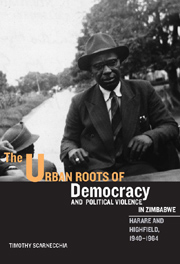Book contents
- Frontmatter
- Contents
- List of Illustrations
- Acknowledgments
- List of Abbreviations
- Notes to the Reader
- Introduction
- 1 Charles Mzingeli's Leadership and Imperial Working-Class Citizenship
- 2 Township Protest Politics
- 3 Resistance to the Urban Areas Act and Women's Political Influence
- 4 Changing Tactics: Youth League Politics and the End of Accommodation
- 5 The Early Sixties: Violent Protests and “Sellout” Politics
- 6 The “Imperialist Stooge” and New Levels of “Sellout” Political Violence
- 7 The ZAPU-ZANU Split and the Battlegrounds of Harare and Highfield
- Conclusion
- Notes
- Selected Bibliography
- Index
- Title in the series
5 - The Early Sixties: Violent Protests and “Sellout” Politics
Published online by Cambridge University Press: 12 September 2012
- Frontmatter
- Contents
- List of Illustrations
- Acknowledgments
- List of Abbreviations
- Notes to the Reader
- Introduction
- 1 Charles Mzingeli's Leadership and Imperial Working-Class Citizenship
- 2 Township Protest Politics
- 3 Resistance to the Urban Areas Act and Women's Political Influence
- 4 Changing Tactics: Youth League Politics and the End of Accommodation
- 5 The Early Sixties: Violent Protests and “Sellout” Politics
- 6 The “Imperialist Stooge” and New Levels of “Sellout” Political Violence
- 7 The ZAPU-ZANU Split and the Battlegrounds of Harare and Highfield
- Conclusion
- Notes
- Selected Bibliography
- Index
- Title in the series
Summary
1960 was proclaimed “The Year of Africa” with independence celebrations planned for seventeen new African nations, including all the remaining colonies of French West Africa, the Belgian Congo, and Nigeria, but the political climate was still hardly festive in southern and central Africa. Nationalists in Nyasaland and Northern Rhodesia were jockeying to be the next leaders, while events in South-West Africa, South Africa, and Southern Rhodesia were to show just how serious the settler states were about denying Africans any significant political power. Protesters had been shot in South-West Africa in September 1959; in South Africa police had shown their willingness to open fire on peaceful protesters in March 1960 during the Sharpeville massacre; and in October 1960, police shot unarmed men in Harare township. With hindsight, it is very difficult to think that a peaceful transition to majority rule in Southern Rhodesia could have occurred, especially given the human and psychological toll caused by the violence in the years following 1960. It is important, however, to try to reassess these crucial years of the early 1960s as they were experienced by those involved, and not to assume that the factional violence that dominated the period between 1962 and 1964 was the only possible outcome. If the following material is considered from the historical actors' perspective, it is possible to consider the gradual realization among nationalists that violence was the only alternative available to them.
- Type
- Chapter
- Information
- The Urban Roots of Democracy and Political Violence in ZimbabweHarare and Highfield, 1940–1964, pp. 94 - 113Publisher: Boydell & BrewerPrint publication year: 2008



